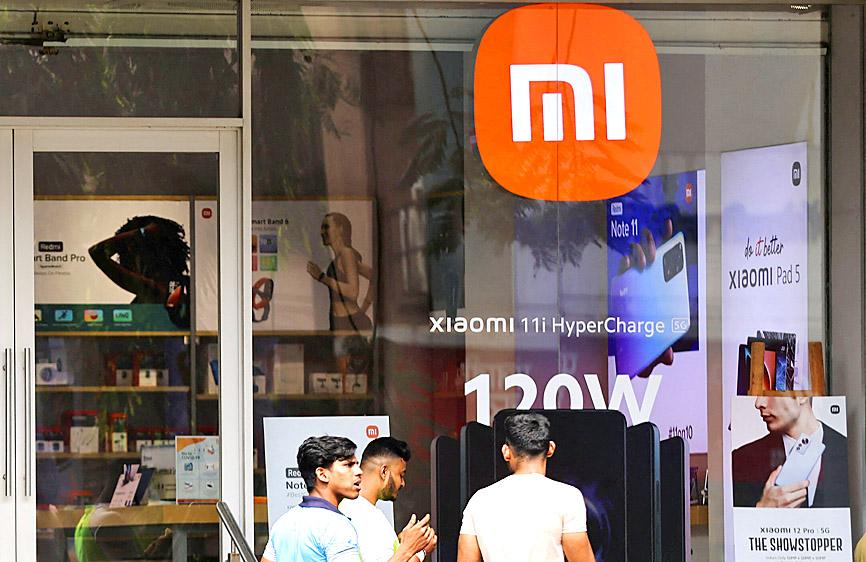A lobby group including Apple Inc and other technology giants operating in India have called out the country’s authorities for misunderstanding how patent fees work, following local officials’ dispute with Xiaomi Corp (小米).
In a letter sent to ministries on Monday, the India Cellular and Electronics Association (ICEA) urged the government to intervene and accused the country’s enforcement agencies of a “lack of understanding” of royalty payments in the technology industry.
The Indian agency that combats money laundering is accusing Xiaomi of moving money out of the country by falsely claiming it was for patent fee payments. The agency seized more than US$700 million from a local unit of the Chinese smartphone maker in April, a move that has since been put on hold pending a final court decision.

Photo: Reuters
While the lobby group’s letter did not name the Xiaomi case specifically, it said that accusing companies of illegal royalty payments could have a “chilling effect” on business in the country.
The risk for the other companies is that Indian authorities apply similar interpretations of royalty payments to other tech firms.
Xiaomi is a member of the ICEA, as are rivals including China’s Oppo Mobile Telecommunications Corp (歐珀) and homegrown firm Lava International, as well as Apple and its Taiwan suppliers Hon Hai Precision Industry Co (鴻海精密) and Wistron Corp (緯創).
Xiaomi has disputed India’s asset seizure, saying that its patent fee payments are justified and its statements to financial institutions have been accurate.
Indian authorities said Xiaomi’s local unit remitted money to three foreign-based entities with ties to Xiaomi, masking them as royalty payments.
Enforcement authorities have taken “a stance that royalty is a simple way to take money out of India,” ICEA said in its letter, addressed to the federal finance, trade and tech ministers, and seen by Bloomberg News.
“We appreciate that it is the duty of agencies to identify malpractice in India, but in this case, they are not well-briefed. Patent implementers are doubly embattled, paying onerous royalty on one side, and facing and fearing enforcement actions on the other,” the lobby group said.
Xiaomi has said that it is being targeted because it is Chinese, insisting that the payments abroad were royalty remittances for using patented technology.
Companies worldwide pay billions of US dollars in such fees annually for using each others’ intellectual property.
Tax raids on Xiaomi and allegations of money laundering have dented the company’s brand image in the country where it is the top seller of smartphones, but the dispute over what counts as royalties could have implications on other smartphone and electronics companies with operations in India.
India is also probing the local units of China’s ZTE Corp (中興通訊) and Vivo Mobile Communications Co (維沃) for alleged financial improprieties, Bloomberg News reported this week.

Vincent Wei led fellow Singaporean farmers around an empty Malaysian plot, laying out plans for a greenhouse and rows of leafy vegetables. What he pitched was not just space for crops, but a lifeline for growers struggling to make ends meet in a city-state with high prices and little vacant land. The future agriculture hub is part of a joint special economic zone launched last year by the two neighbors, expected to cost US$123 million and produce 10,000 tonnes of fresh produce annually. It is attracting Singaporean farmers with promises of cheaper land, labor and energy just over the border.

US actor Matthew McConaughey has filed recordings of his image and voice with US patent authorities to protect them from unauthorized usage by artificial intelligence (AI) platforms, a representative said earlier this week. Several video clips and audio recordings were registered by the commercial arm of the Just Keep Livin’ Foundation, a non-profit created by the Oscar-winning actor and his wife, Camila, according to the US Patent and Trademark Office database. Many artists are increasingly concerned about the uncontrolled use of their image via generative AI since the rollout of ChatGPT and other AI-powered tools. Several US states have adopted

KEEPING UP: The acquisition of a cleanroom in Taiwan would enable Micron to increase production in a market where demand continues to outpace supply, a Micron official said Micron Technology Inc has signed a letter of intent to buy a fabrication site in Taiwan from Powerchip Semiconductor Manufacturing Corp (力積電) for US$1.8 billion to expand its production of memory chips. Micron would take control of the P5 site in Miaoli County’s Tongluo Township (銅鑼) and plans to ramp up DRAM production in phases after the transaction closes in the second quarter, the company said in a statement on Saturday. The acquisition includes an existing 12 inch fab cleanroom of 27,871m2 and would further position Micron to address growing global demand for memory solutions, the company said. Micron expects the transaction to

A proposed billionaires’ tax in California has ignited a political uproar in Silicon Valley, with tech titans threatening to leave the state while California Governor Gavin Newsom of the Democratic Party maneuvers to defeat a levy that he fears would lead to an exodus of wealth. A technology mecca, California has more billionaires than any other US state — a few hundred, by some estimates. About half its personal income tax revenue, a financial backbone in the nearly US$350 billion budget, comes from the top 1 percent of earners. A large healthcare union is attempting to place a proposal before